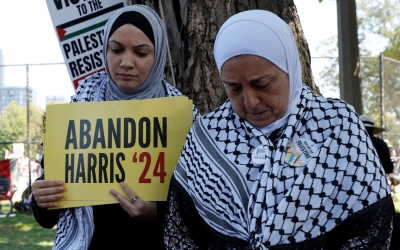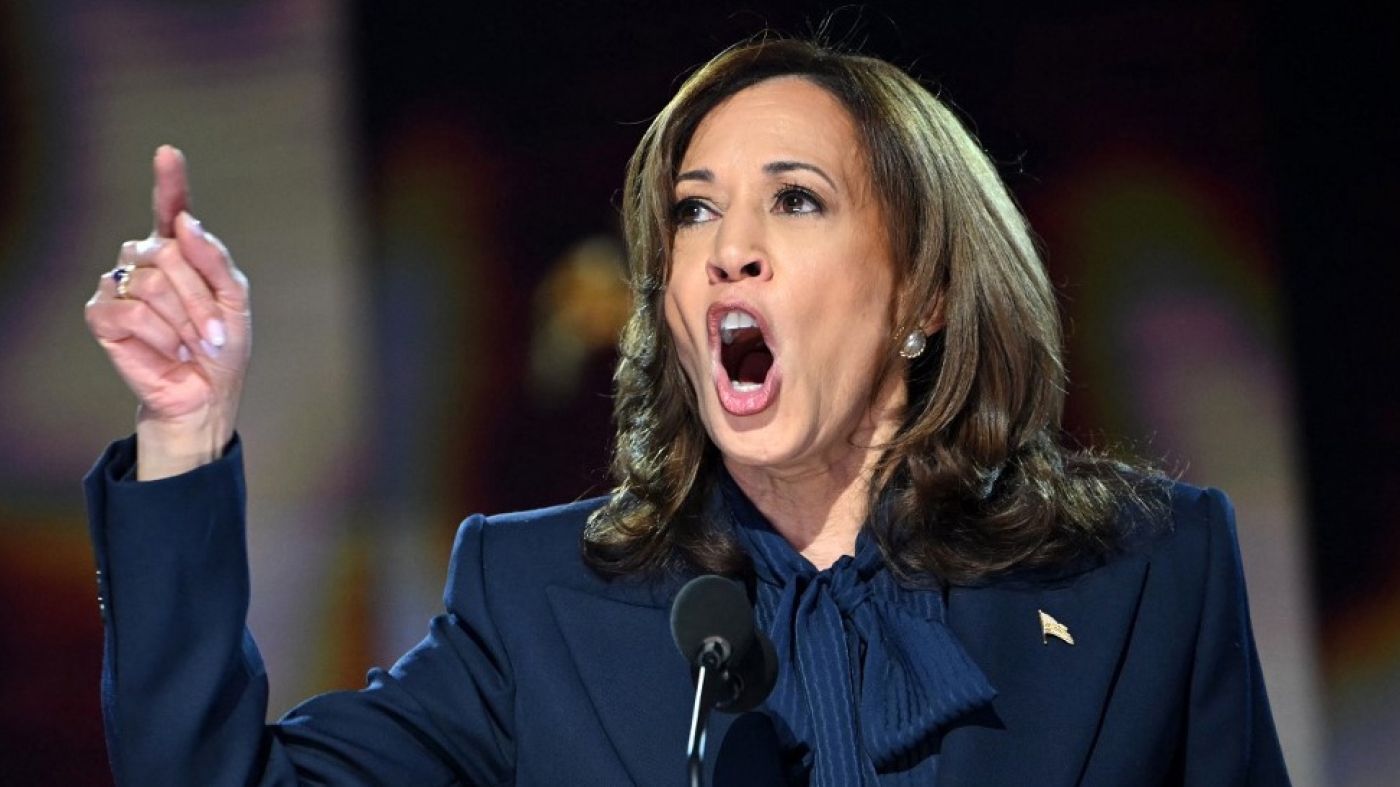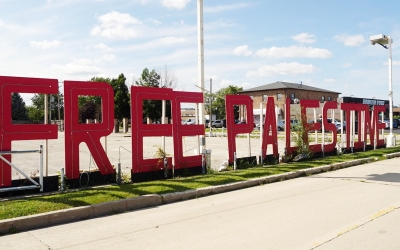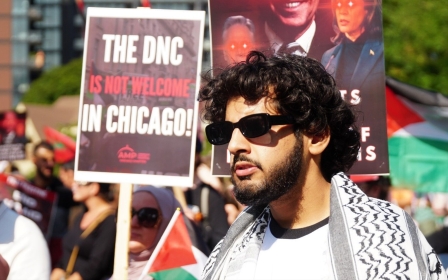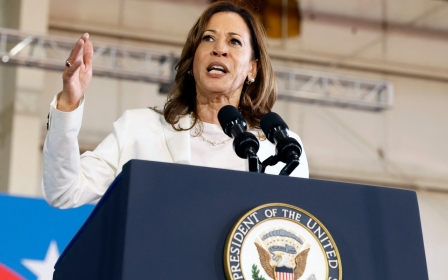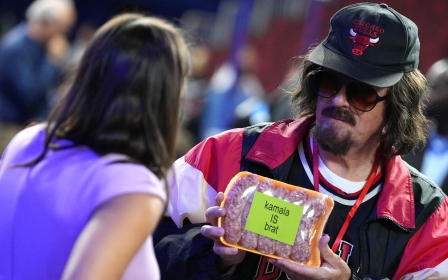US election: The difference between pro-Palestine groups 'Uncommitted' and 'Abandon Harris'
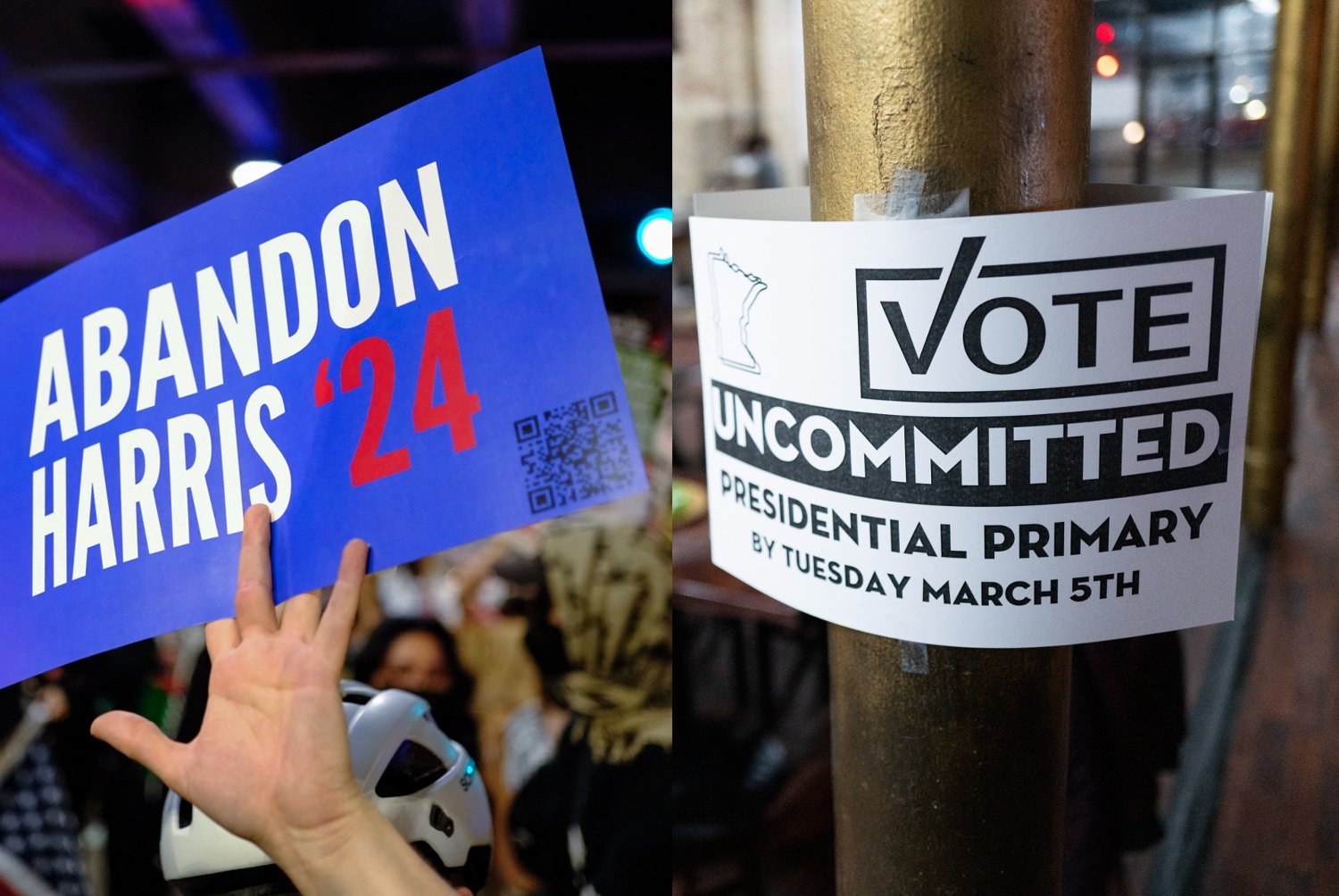
Israel's war on Gaza, accompanied by US support, has led to mass outrage among Muslim and Arab Americans and pro-Palestinian groups who have mobilised against the war in numerous ways.
Huge pro-Palestine protests have been organised on a regular basis, activists have targeted arms manufacturers, and dozens of student-led Gaza solidarity encampments have popped up on university campuses across the US.
Electorally, two major Muslim and Arab-led initiatives have emerged. But while these groups appear to be aligned and are often seen as interchangeable, they are quite distinct.
How did Abandon Harris and Uncommitted evolve?
Abandon Harris (formerly Abandon Biden), has vowed to do everything in its power to get voters to turn away from Harris and the Democratic Party for its continued support for the war on Gaza.
New MEE newsletter: Jerusalem Dispatch
Sign up to get the latest insights and analysis on Israel-Palestine, alongside Turkey Unpacked and other MEE newsletters
In contrast, the Uncommitted movement began by urging voters to choose "uncommitted" during the Democratic primary cycle as a protest vote against US President Joe Biden. Since Harris replaced Biden for the Democratic ticket, the movement has called for an arms embargo on Israel but is maintaining its support for the Democrats despite not winning any of the concessions it has asked for.
During the first few months of Israel's war and during the primary election cycle, the two groups at times worked together to get the "uncommitted" vote out in states like Michigan and Minnesota. But now, the groups have diverged and stand starkly apart from each other.
Uncommitted has fully embedded itself with the Democratic Party despite the Democratic administration continuing to provide military support for Israel’s war effort in Gaza, which has killed more than 40,000 Palestinians and left the majority of the besieged enclave in rubble.
Abandon Harris is trying to chart a path outside of either the Democratic or Republican parties, both of whom are fully committed to Israel.
What is the Uncommitted movement?
The Uncommitted movement began at the start of 2024 and was launched by a consortium of activists in Michigan as well as several Democratic Party operatives of Muslim and Arab heritage.
The goal of the movement was to turn out voters in the Democratic Party and get them to select "uncommitted" during the primary elections when President Biden was still in the race.
In the key swing state of Michigan where Donald Trump won by only 10,000 votes in 2016, more than 100,000 people cast their ballot for "uncommitted". In total, more than 650,000 in the US cast a protest ballot against Biden over his support for the war on Gaza.
"I think the Uncommitted movement is very significant in the sense that as long as I've been alive, we've never seen this happen inside the Democratic Party, where people have basically said, we're going to withhold our vote or from a candidate because of their support of Israel, which [has for] so long dominated both parties," Jared Houston, a union member of United Food and Commercial Workers who was in Chicago for the DNC, told Middle East Eye.
The movement had significant momentum over the past few months, as the campaign received national media attention. And with a small group of 30 Uncommitted delegates heading to the Democratic National Convention, they were hopeful they could get the Democratic Party to alter its policy on Israel and Gaza.
How has Uncommitted reacted to Kamala Harris?
Joe Biden dropped out of the presidential race on 21 July 2024, and was replaced by Vice President Kamala Harris as the presidential nominee. But since then, it's been unclear where the Uncommitted movement is headed.
"The Uncommitted movement is just one faction of the raising [of] the awareness about Palestinian Liberation, ending the genocide. It's one tactic. It's not the only tactic," Nazik Sankari, of the US Palestinian community network, told MEE.
Uncommitted leaders responded to Harris' ascension with excitement and enthusiasm, claiming that the vice president was more empathetic to Palestinians than Biden, and also claiming that Harris was open to a meeting to discuss an arms embargo on Israel. But Harris' aides have openly denied she is open to an arms embargo, and Harris has repeatedly said she is committed to Israel's "right to defend itself".
What happened to Uncommitted at the DNC?
At the Democratic National Convention in Chicago in August, the movement was given the space to host an official DNC panel on Palestinian human rights on the sidelines of the event. The move was celebrated as a major win for the group, and Uncommitted delegates publicly distanced themselves from the protests taking place outside and inside the convention, framing the group as committed Democrats willing to operate within the party's electoral system.
Other pro-Palestinian delegates tried a more visible approach, with one group of delegates raising a "Stop Arming Israel" banner that led to one of them - a visibly Muslim woman wearing a hijab - being physically assaulted by another delegate.
When the group was denied the chance to have a Palestinian speaker on the main convention stage, Uncommitted delegates tried staging a sit-in to demand a Palestinian speaker - but the final day of the DNC came and went without one. The delegates eventually ended their sit-in and took their seats inside the convention hall.
How do pro-Palestine groups view Uncommitted?
With Harris making no concessions on US military aid to Israel, and Israel's war on Gaza continuing with prospects of a ceasefire appearing slim, Uncommitted continues to wed itself to the Democratic Party.
The movement's loyalty to the Democrats has raised eyebrows from other pro-Palestinian advocates.
"It doesn't give people another alternative, something outside, something beyond the two parties that would actually lead to real change in Gaza," said Houston.
"I think we have to recognise that in some ways, it's a step forward, and keep trying to pressure those delegates who have these beliefs to leave the Democratic Party. That would be more significant than just continuously trying to reform this corrupt institution that's never going to change."
What is the Abandon Harris movement?
The Abandon Harris campaign was officially launched in December as Abandon Biden, after calls from activists within the Muslim American community for a ceasefire in Gaza were ignored by the Biden administration.
The campaign only had one goal: punish Biden for his support for Israel's war on Palestinians by turning as many voters as possible against him in the upcoming presidential election in November.
While other voter outreach efforts are usually aimed at telling voters who to vote for, the Abandon campaign has a different approach. For them, the goal is to get Americans to vote for anyone other than the Democratic Party.
In the first few months of the campaign, there was some overlap between Abandon Biden and Uncommitted, with the two groups working together during the primary election cycle in states like Minnesota.
After the primaries were over, the contrast between the two became more evident.
When did Abandon Harris and Uncommitted split?
On 19 August, Abandon Biden officially rebranded as Abandon Harris, after the vice president silenced pro-Palestinian supporters during a rally in Detroit.
"We feel that there's no other path for us but to do what we did after issuing this policy ultimatum [last year]. We now need to leverage our power, our votes, and make clear who Kamala Harris is," Hassan Abdel Salam, a co-founder of the campaign, told MEE ahead of the launch.
"Kamala Harris is a frightful, a despicable option for our country. [She is] someone who can't even, who can't say that genocide is unacceptable to American policy."
Abandon Harris held its separate convention in Chicago the day before the start of the DNC, and while some members joined the protests outside the Democratic convention this week, others travelled back to their home states to begin voter outreach.
They did have a message for activists trying to appeal to the Democratic Party in the hope of achieving a policy change regarding Israel and Gaza.
"The DNC's recent actions have only confirmed what we've been saying all along: the Democratic Party has no interest in ending the genocide. They are active participants in this brutal, unforgivable genocide," Abandon Harris said in a statement on Friday.
"Let’s be clear: appealing to the conscience of the Democratic Party is a waste of time. They have no conscience. They have no moral compass."
Does Abandon Harris back any candidates?
The movement has not endorsed any one candidate. But several prominent third-party candidates, including Jill Stein and Cornell West, have appeared at their rallies and press conferences.
Its aim is to build a new political vision for Muslim Americans, Arab Americans, and pro-Palestinian advocates which exists outside of the current two-party system.
"We need to revisit why we embarked on this path in the first place and why it's crucial that we follow through to send a clear message," Hudhayfah Ahmad, the communications director for Abandon Harris, told MEE.
"If we don't stay firm, follow through, and go all the way, the consequences will be that neither party will ever take us seriously again."
However, one obstacle they face is getting through to the many Muslim and Arab American voters disillusioned with the electoral system after seeing the bombing of Gaza continue largely unabetted for nearly a year now.
"Electoral politics, in my personal opinion, can only go so far," said Sankari of the US Palestinian community network.
"I am a community organiser, the US Palestinian community network in Chicago, and we have been part of a coalition for Justice in Palestine, organising mass mobilisations and protests over the last 10 months. And this is our tactic."
Middle East Eye delivers independent and unrivalled coverage and analysis of the Middle East, North Africa and beyond. To learn more about republishing this content and the associated fees, please fill out this form. More about MEE can be found here.


